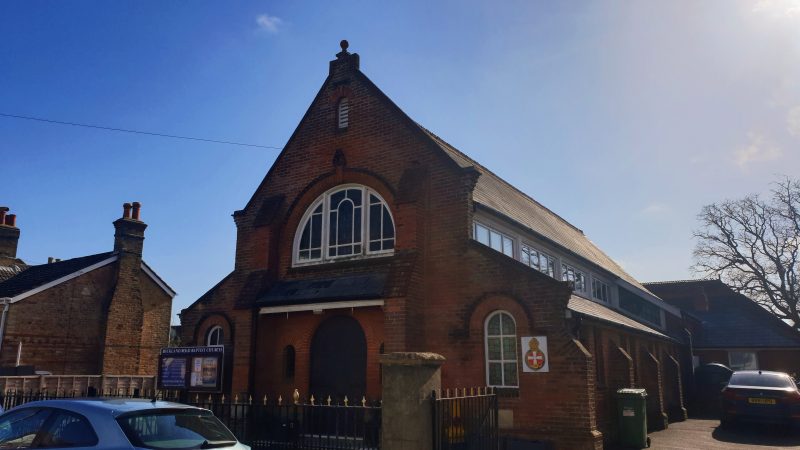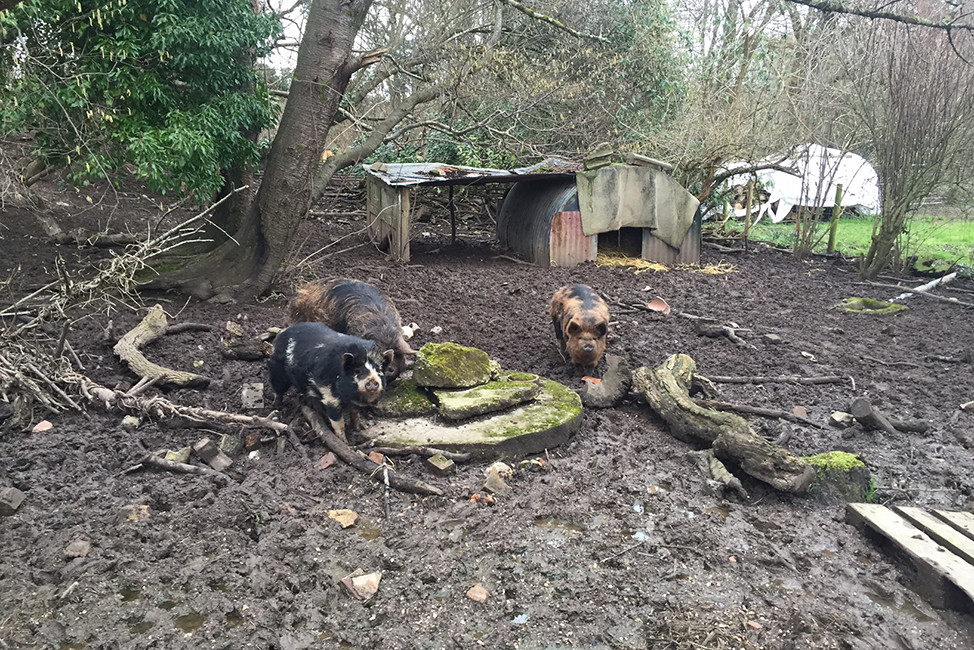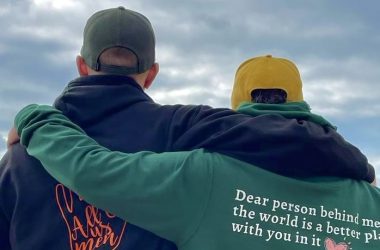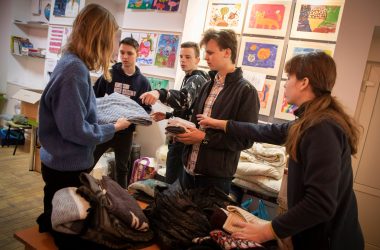As the sound of the organ fills the hall, a handful of septuagenarians lift their voices in hymn, faces illuminated by the sun beams streaming through the stained glass. A blue candle flickering before a vase of yellow tulips, as a reminder of prayer for the tragedy in Ukraine, seems also a fitting symbol for the flame of fraternity that continues burning within the small but strong elderly congregation of Buckland Road Baptist Church.
In today’s age, turning on your WIFI is enough to be connected to anyone in the world at any time, yet there seems to be a consistent increment in loneliness across all demographics in the UK. The elderly population of Bournemouth and Poole are no exception.
Eric Damerell, a senior gentleman with a confident air, recalls the worst part of the early days of the pandemic, describing the lack of connection with his daughter as a “disturbing” symptom of the crisis. He recalled, “I normally go to my eldest daughter’s for tea every Friday but that was.. cancelled, suspended for quite a long time, yet they don’t live many roads away. She would do some shopping for me and bring it to the door, that was the only time I saw her — I couldn’t ask her in, that was, that was a bit disturbing” He paused for a second, “I’m quite well, but I mean there’s always a thought that next time she comes, I won’t be here.” Excerpts from an interview:
Do you think people of your age are more vulnerable to loneliness?
Sitting across the pew, Eric sighs lightly before answering; “Yes, I think they [are]. Probably fear kick[s] in, you know if I get this bug I might be rushed to hospital, can’t see anybody etcetera, that enhanced the loneliness. Fortunately I was alright. I only had a positive test come right at the end I had to do 10 days isolation, but by then I had got used to it!” He laughed.
What would be your definition of loneliness?
“Loneliness is when you find yourself wondering what you’re going to do next. [When] you seem to have used up all the little bits that keep you occupied and you suddenly hit a brick wall, and there are times when it can be a little bit disconcerting.”
Has the pandemic changed your perception of loneliness?
“No, not really. I lost my wife 11 years ago, she’d been ill for quite over a year prior to that but I had been able to sort of get used to it, expecting it at the time, and when it happened yes, it was a bit of a shock, and you are lonely for a while you don’t quite know what direction you’re going to go in.
Fortunately I had the church around me, and it all helped. Beryl was very helpful, but I had known Beryl for about 20 years and we only got together after my wife died. It was most unusual, never expected, but there you are, these nice things do happen!” He laughed openly.
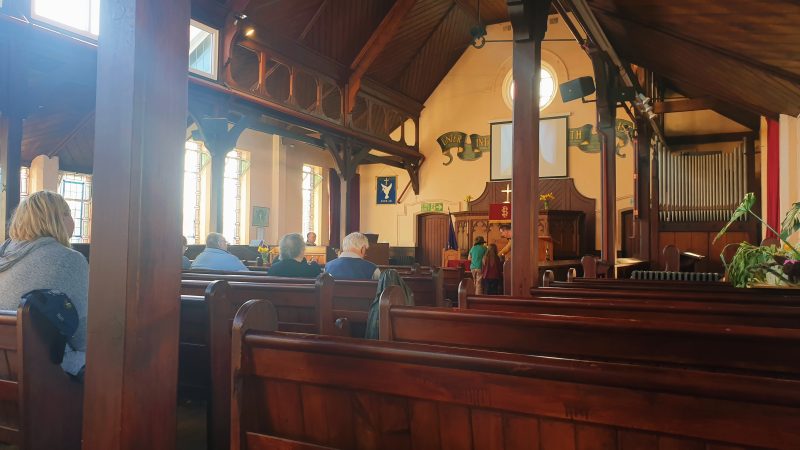
Touching on Church support in times of crisis, several members praised Beryl for her idea of a Bulletin to keep a sense of connection.
When asked about her role, Beryl herself said “Oh I don’t know” She laughed, “I sort the flowers out every week, and then either give them away to people that are here or go and deliver them. I produce this bulletin every week which I started to do when the pandemic first hit and we were having to close the church, and I thought it was a way of keeping in touch with people because a lot of the people that come here are not online so they [can’t] use social media at all, nor [can] I, but that’s probably another story.” She smiled.
“I thought at the time it would last maybe 2 or 3 months, but I now I’ve just done issue 103!”
Is this how you managed to keep a sense of unity?
“Sometimes I just stick them [bulletins] through peoples letterboxes. If I’ve got time I’ll knock on the door and even if I couldn’t go in, we’d have a conversation at a distance, maybe only for ten minutes, sometimes not as long as that, but that was – you know- just trying to keep in touch with people.”
Discussing the proclivity of loneliness in the area, Beryl mentioned: “I think it’s always been a problem since before the pandemic. There’s a lot of people that once their work finishes, or their partner dies.. they’ve got no extended family, extended group of friends, that they can rely on- particularly men!
I think women tend to keep social contacts easier than men do. Whether that’s true nationally or whether it’s just my observations with people – I don’t know.”
Rev. Jonathan Martin, 67, ordained minister, deacon of Buckland Road Baptist Church for the past 4 years, reflects on his observations in the community: “I used to work as half-time chaplain to the borough of Poole, so I worked with the statutory organisations and I would say there is significant loneliness in a number of communities, particularly for example in, (this is experiential, rather than evidential) but as someone who visited people in the community particularly in places such as Lilliput and Lower Parkstone.
Where people are capital rich, they may have moved here later in their lives, and then a partner or spouse has died, and they suddenly find themselves in a house that has capital value but their income level has reduced and they’re on their own, and they don’t have a strong network of friends around them because they moved here perhaps in their 60’s or 70’s.”
As you also have a background in psychology, do you have any opinion on the wider implications of isolation on people over these two years, especially in limiting the reach of the Church as an active participant in the community?
I think it’s been hugely demanding on people psychologically, emotionally, physically – in every way. Because one of the reasons people come to church is for fellowship, and whether that’s a simple act of you and I talking to each other or comparing notes, that’s missing. And that’s an element that continues to be missing – FaceTime or whatever it may be, that doesn’t compensate in nearly the same way. You know, to see someone, to talk to them, build a relationship with them is important and that’s been missing.
What would be the way out of this situation?
“Prayer is a gift that the Christian community can bring to helping people feel supported, not only praying for people, but also we teach people how to pray, and to read God’s word, and to know that God is a present reality through the Holy Spirit, the Comforter. That brings a sense of presence that others may not experience, who don’t have that giftedness. And objectively I don’t want to challenge that, but I want to say it’s a gift that the Christian faith brings in reality to people.”
Is there anything that as a Church family has been missing over the pandemic that inhibited a sense of unity amongst you?
“I think people have missed a great deal through not having music, many here for whom music is a gift, some play instruments, whether its bells or a piano or an organ, and there’s been quite a strong tradition led by our organist David of having a community choir some of whom are church members, many of whom are not. So that ability to make music together whether it be Christian worship or good quality community song I think has been missed hugely by people. That sense of togetherness that comes from singing together.”
Any closing thoughts on the importance of faith in overcoming loneliness epidemic in the BCP area?
“Ultimately I believe that those rational gifts we have, have real value, and can bring and can bring people back to a point of wholeness but ultimately, wholeness comes through Jesus Christ alone. So in a damaged society that’s become yet more damaged – some of that damage may be permanent. Having said that, there have been great stories of kindness, and love, and charity, and people being very supportive of each other, not only amongst Christians. In fact sometimes Christians haven’t been as strong as we might be in terms of demonstrating that care and love.”





